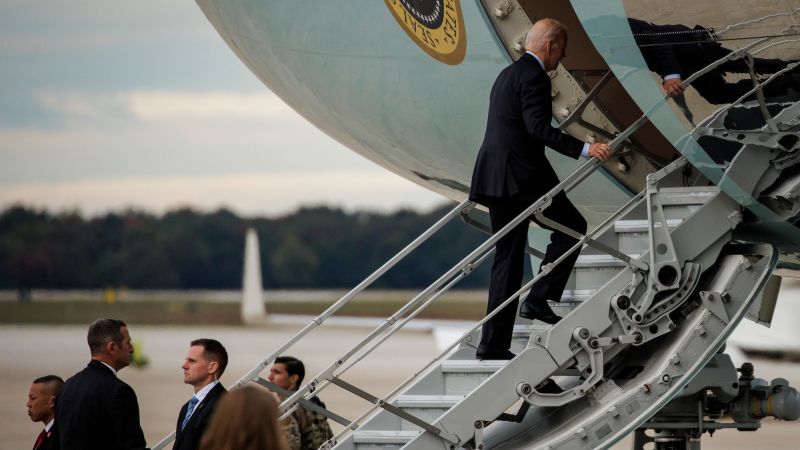President Joe Biden’s mission to contain Israel’s confrontation with Hamas was overtaken even before he left Washington on Tuesday evening by fast worsening events that threaten to spill over into a regional war.
A devastating blast at a hospital in Gaza believed to have killed hundreds of people prompted Jordan to cancel the second leg of Biden’s trip. After a visit to Israel, he’d been due in Amman to meet key Arab and Palestinian leaders.
The tragedy – blamed by Hamas on Israel and by Prime Minister Benjamin Netanyahu’s government on another Palestinian radical group, Islamic Jihad – reflected the stark risks of a presidential trip amid accelerating events and in a war zone.
But while Biden may be putting his personal security and political prestige on the line, he would have taken a bigger risk by staying home.
That’s because he’ll arrive in Israel Wednesday with the Middle East in peril of sliding toward a disastrous wider war following the barbarism of Hamas attacks on Israeli civilians, which killed more than 1,400 people, and the pounding of the Gaza Strip by Israeli forces in response, which has killed more than 3,000 people, according to authorities on both sides. Following the Gaza hospital blast, protests erupted across the region, including in the West Bank, Lebanon, Iraq, Iran and Tunisia, as anger over Israel’s response to the Hamas attack reached a new level of intensity ahead of Biden’s arrival in the region.
Biden is seeking to apply US power and demonstrate deterrence to Israel’s adversaries in a way that only a presidential visit – twinned with the deployment of two aircraft carrier battlegroups – can convey. He will express emotional solidarity with the Jewish state in one of its darkest hours but also strive to alleviate the calamitous plight of Palestinians trapped in Gaza amid relentless Israeli strikes against its Hamas rulers.
His mission represents the most intense engagement by a president in Middle East crisis diplomacy in many years after a long period in which US presidents steered clear of a seemingly intractable Israeli-Palestinian conflict. It comes with Biden already deeply invested in another boiling global crisis with massive implications – Ukraine’s effort to repel a Russian invasion that threatened to wipe it off the map. And like any major presidential intervention in a troubled world, Biden’s visit carries the possibility of failure that could damage his political standing at home.
Biden needs to fill a vacuum because an absence of a political or diplomatic dialogue means violence. And the tortured region’s history shows that one horror inevitably begets another in a bloody cycle of escalation and retribution that feeds radicalism and future violence. The world cannot afford the Middle East to be consumed by flames yet again, at a time when war and totalitarianism are challenging the Western order and democracy.
The United States is a vital power in a moment of extreme tensions – not least because it is pledged to Israel’s defense, and it has its own vital interests in containing the crisis. A wider war involving the Jewish state could drag in the United States – a scenario that could represent a nightmare for Biden politically and the United States more generally. Distant leadership is not an option at a moment of such danger, even if Biden cannot control the aftermath of his efforts because of forces driving the behavior of Hamas, Israel and regional powers.
“The deeper you get in, the more you are a co-author of the story, so make sure that the story is one that you shape,” CNN senior political analyst David Axelrod said on “CNN This Morning” on Tuesday, as he sized up the risks Biden is taking.
“He is a central actor here, he ought to behave like a central actor. This is a critical moment, to show the seriousness of our support and our concerns, the president’s presence will be meaningful.”
Scenes of Palestinians being pulled out of the rubble of a bombed hospital on Tuesday made Biden’s already treacherous mission even tougher. In fact, it was exactly the kind of tragedy – with the possibility to spark wider turmoil – that Biden had hoped to prevent by traveling to the region.
Hamas accused Israeli forces of attacking the hospital and killing between 200 to 300 people. The Israel Defense Forces, however, said that intelligence showed that the strike was caused by a barrage of rockets fired toward Israel by the Islamic Jihad group that landed short.
An Israeli official and another source familiar with the matter told CNN’s Oren Liebermann and Zachary Cohen Tuesday that Israel had provided the US with intelligence it has gathered related to the deadly Gaza hospital explosion. The US is analyzing the Israeli intelligence and that message has been communicated to at least some lawmakers by Biden administration officials, the source familiar said.
Whatever the confirmed cause, the result was the same – more innocent civilians perishing in a quickening loop of violence that threatens to evade the capacity of any of the perpetrators to control it. That’s why it is incumbent on Biden to try to use America’s power to tame the worsening crisis.
The president was already on his way to Andrews Air Force Base in Maryland when news broke that his trip to Jordan had been canceled as a result of the hospital blast. He had been due to meet King Abdullah, Egyptian President Abdel Fattah el-Sisi and Mahmoud Abbas, the leader of the Palestinian Authority, which administers the West Bank but not Hamas-controlled Gaza.
“There is no benefit to anyone in holding a summit at this time,” said Jordan’s Foreign Minister Ayman Safadi on Al Jazeera Arabic.
The White House issued a statement saying that the visit had been postponed because of a period of mourning following the hospital explosion but made no comment on the cause of the blast. “The President sent his deepest condolences for the innocent lives lost in the hospital explosion in Gaza, and wished a speedy recovery to the wounded,” the statement said.
The cancellation of the Jordan leg of the trip presents Biden with a serious optics problem since he now risks being seen in the region as siding with Israel without an opportunity to listen to the concerns of Arab leaders about the terrible humanitarian conditions faced by Palestinians under Israeli bombardment.
Secretary of State Antony Blinken and other US officials tried for days – without apparent success – to engineer the opening of the border crossing between Gaza and Egypt to allow Gazans with US and other foreign passports to leave. Piles of humanitarian supplies have been accumulating on the Egyptian side of the border.
With Gazans desperate for water and basic supplies cut off by Netanyahu’s government – they say, until the hundreds of hostages held by Hamas are returned – Biden’s credibility with Arab leaders depends on his capacity to secure humanitarian concessions from the Israelis. The US president’s goals are not simply based in morality. A global outpouring of support for Israel risks overshadowing the growing human toll of its attacks against Hamas targets in Gaza. Footage of dead and injured Palestinian civilians makes reprisal attacks by Israeli adversaries like Hezbollah more likely, which in turn raises the possibility of a devastating response that means the war will spread into Lebanon.
Fury over Israel’s tactics, meanwhile, increases the heat on Arab leaders from their own populations and the possibility of street violence. Clashes have already broken out in Ramallah, the seat of the Palestinian Authority in the West Bank after the Gaza hospital blast. And any hope that the US has of saving a regional peace initiative – which is aimed at a normalization of relations between Israel and Saudi Arabia and could reshape the Middle East and isolate Iran – could rest on Biden containing Israel’s war with Hamas. But after spending years trying to extricate itself from the Middle East, its post-9/11 wars and a prolonged period when successive American administrations all but ignored the plight of the Palestinians, US diplomacy also badly needs its credibility restored in the Middle East.
Biden and Israel
Biden will arrive in Israel less than two weeks after one of the most traumatic days in its existence, which shattered the country’s illusion of security and will have psychological after-effects that will play into its politics for years to come. His decision to stand with a badly weakened Netanyahu, whose legacy will now be dominated by one of the worst intelligence and military failures in his country’s history, offers the Israeli prime minister a priceless political boost. It also sends the clearest of messages – alongside a US military build-up in the region – to Israel’s enemies that the Jewish state is not alone and will be defended by the United States.
Biden is also forging his own bond of trust with Israelis after months when Netanyahu’s far right-wing coalition has been tearing deep national divides. Biden’s capacity to influence Israeli policy and the intensity of Israel’s coming Gaza offensive could be significantly enhanced by putting Netanyahu in his debt and by emerging as figure of credibility with Israelis.
That process started in the first hours after the attacks when Biden characterized the Hamas attacks and what they meant not just to Israelis but in the modern history of Jewish people.
“This was an act of sheer evil,” Biden said on October 10. “This attack has brought to the surface painful memories and the scars left by a millennia of antisemitism and genocide of the Jewish people. … So, in this moment, we must be crystal clear: We stand with Israel.”
Yet in Biden’s rhetoric, and in US calls for Netanyahu to respond in the “right way,” there is also a sense that Biden is seeking to temper the most extreme reactions to the Hamas attacks and trying to shield Israel from the consequences of its own possible excesses.
The global consequences of a widening war in the region are reason enough for Biden to devote increasing amounts of time to averting an even worse crisis. But everything that presidents do is political. Footage is beamed back from foreign trips that shapes a commander in chief’s image at home. The situation is especially important for Biden, who is beset by low approval ratings a year out from a possible 2024 rematch with former President Donald Trump.
The optics of the 80-year-old president leaving at short notice for a daring trip to a war zone, as he did in a surprise trip to Ukraine earlier this year, is likely to please Democrats, who have had to answer questions about his age and suitability for office. Foreign policy rarely decides US elections but a demonstration of global statesmanship by Biden that succeeds in easing tensions and therefore enhances US security would create a contrast with Trump, whose extraordinary rebuke of Netanyahu last week revealed how his potential return to the White House would again entangle US diplomacy with his ego and personal grievances.
Biden’s sudden decision to visit Israel in the middle of a war is a show of political stagecraft that Trump, ever the showman, might have attempted had he been in the Oval Office. There was a hint of jealously and resentment in Trump’s response to Biden’s turn in the global spotlight when the ex-president was asked to comment while at his fraud trial in New York on Tuesday – which is in itself a glaring comparison with Biden’s mission.
“I think everything he does is political and, unfortunately, everything he does doesn’t work out very well,” Trump said.
Read the full article here





